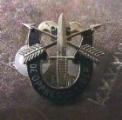I think there were probably two poles:
- A few of what most would consider a sensible refusal to do something illegal or bone stupid that the system virtually had to illuminate and that many resulted in a mere wrist slap while a very few were miscarriages of justice.
- A few egregious acts of sheer cowardice (or abysmal stupidity based on flawed principle) that merited a more harsh punishment than they received with perhaps the odd miscarriage of justice.
...And the majority of those refusals fell in between those two poles. Without being present and witnessing events, all we can do is speculate. I tend not to put much faith in written ex post facto reports -- most have an agenda. Come to think of it, that's true of most records and reports out of Viet Nam IMO. Lot of fudging went on...

I can however go beyond speculation on the spread of the problem -- political correctness and diffidence caused by changes in moral values in the west generally during the 1960s and by the perceived unpopularity (not only perceived with respect to the Media and most politicians, just with respect to the bulk of the US populace...) of that war.

ADDED: Missed thisAgree, generally nothing should be said but IMO, any questions from observant Troops should be answered honestly with an explanation that avoids the perception of "look what I'm doing..."








 ).
).







Bookmarks